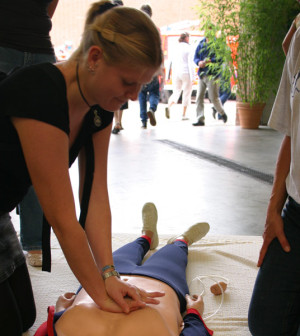- Could Your Grocery Store Meat Be Causing Recurring UTIs?
- Are You Making This Expensive Thermostat Error This Winter?
- Recognizing the Signs of Hypothyroidism
- 10 Strategies to Overcome Insomnia
- Could Artificial Sweeteners Be Aging the Brain Faster?
- Techniques for Soothing Your Nervous System
- Does the Water in Your House Smell Funny? Here’s Why
- Can a Daily Dose of Apple Cider Vinegar Actually Aid Weight Loss?
- 6 Health Beverages That Can Actually Spike Your Blood Sugar
- Treatment Options for Social Anxiety Disorder
1 in 10 Stroke Rehab Interruptions May Be Preventable

Interruptions in inpatient rehabilitation occur for some stroke survivors and patients with brain and spinal cord injuries, a new study finds.
But at least one-tenth of these treatment breaks could be prevented, resulting in improved patient outcomes and lower health care costs, the researchers said.
The findings indicate that inpatient rehabilitation facilities “are performing well in preventing complications,” said researchers led by Addie Middleton of the University of Texas Medical Branch, Galveston. But “given that more than one in 10 of the rehospitalized patients returned to acute care for a potentially avoidable condition, there is still room for improvement.”
For the study, the researchers analyzed Medicare data on about 80,000 patients undergoing inpatient rehabilitation for stroke (72,000), brain injury (7,100) or spinal cord injury (660). All went to rehabilitation directly from the hospital.
Rehabilitation interruptions occurred in 0.9 percent of stroke patients, 0.8 percent of brain injury patients and 1.4 percent of spinal cord injury patients. In most cases, patients were transferred back to the hospital for treatment of complications, the investigator found.
Overall, about 11 to 12 percent of the rehabilitation interruptions may have been preventable, including 15 percent of those in stroke patients, the researchers said.
Preventable causes of rehabilitation interruption included dehydration, heart failure, pneumonia and urinary tract infections, according to the report.
“Reducing rates of program interruptions and short-stay transfers will not just improve patient experiences of care, they will likely also translate to lower Medicare spending per beneficiary,” Middleton and her colleagues said.
The findings were published online recently in the American Journal of Physical Medicine & Rehabilitation.
More information
The U.S. National Institute of Neurological Disorders and Stroke has more on stroke rehabilitation.
Source: HealthDay
Copyright © 2026 HealthDay. All rights reserved.










